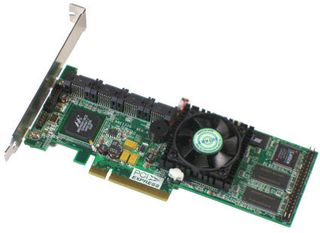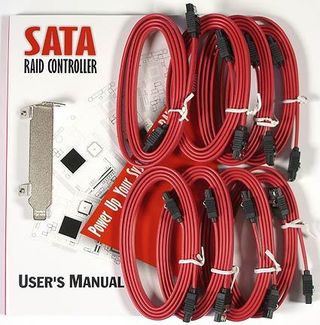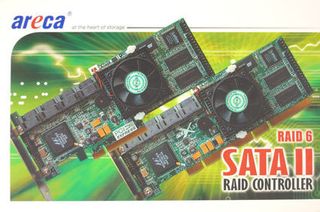SATA Spells Trouble for SCSI RAID: Five Controllers Put to the Test
Areca ARC1220

Taiwan-based storage specialist Areca has become quite popular for its SATA RAID controller cards with RAID 6 support . RAID 6 adds an extra redundancy layer; instead of using the equivalent of one hard drive in every array to store parity data, RAID 6 will generate a second distributed parity dataset. This impacts performance and reduces the array capacity by the storage capacity of two drives rather than one, but it allows two drives to go south without data loss, rather than just one.
The ARC1220 is the only controller card that comes with a x8 PCI Express interface. As a result, it required either a server/workstation motherboard that is up to date or one of the PCI Express desktop motherboards; any x1 or x8 PCI Express card can of course be operated in a x16 slot as well. At the end of the day we couldn't find any advantage of PCI Express from a performance point of view. However, we are happy to see that finally there is somebody offering professional PCIe hardware, as graphics certainly is not the only use for the new interface.
Areca allows you to set some basic things parameters that we did not find covered by its competitors. For example, the user may select which speed the SATA ports run at - 150 or 300 MB/s - and whether or not NCQ is enabled. If the main purpose of a RAID array is high sequential throughput, NCQ may be useless.
You cannot influence the recovery option however, which causes the ARC1220 to automatically start an array rebuild operation as soon as it detects any new hard drive whose size at least matches those of the RAID array members. Removing an array member causes the controller to alert the user acoustically and using the software interface; the acoustic alert can be disabled. Firmware updates can be made using the web interface.
The card comes with 128 MB of integrated cache memory, and of course, it is secured against data corruption through ECC. Performance-wise, the ARC1220 did not disappoint; although we did not run RAID 6 benchmarks due to time constraints, the card managed to outperform AMCC's 9550SX series in several disciplines. However, it is also a bit more expensive than the AMCC/3Ware card, and it has to compete against 3Ware's excellent reputation.


Stay on the Cutting Edge
Join the experts who read Tom's Hardware for the inside track on enthusiast PC tech news — and have for over 25 years. We'll send breaking news and in-depth reviews of CPUs, GPUs, AI, maker hardware and more straight to your inbox.
Most Popular

